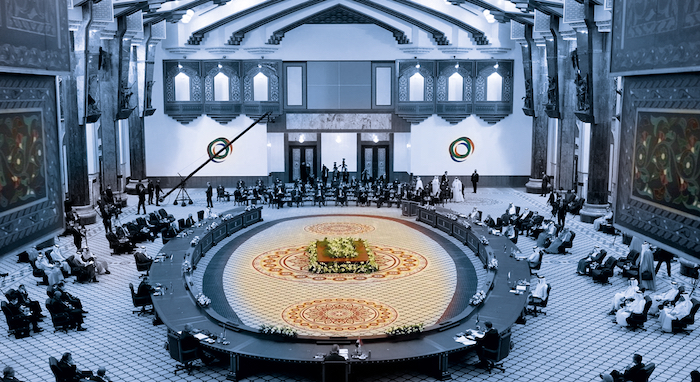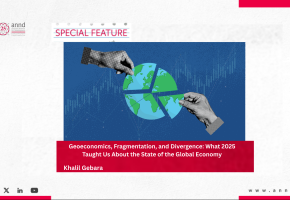
Baghdad Summit 2021: media success, social interaction and political failure
Roots of the Security Crisis
Since 2003, Iraq has been suffering from accumulating crises, particularly a crisis in security. Events that marked this bloody phase began with the bombing of the United Nations Mission in Baghdad on August 19 and targeting its head, Mr. Sergio Demello, along with a number of employees. A few days later on August 29, Ayatollah Muhammad Baqir al-Hakim, the spiritual leader of the Supreme Islamic Council, was targeted in Najaf. The first ten years were marked with a series of explosions, interspersed with sectarian fighting in 2006, resulting in deep social cracks. It was followed by the armed resistance against the US occupation. The latest round saw the occupation of a third of Iraqi territory by ISIS gangs.
Efforts by successive Iraqi governments to break the security choke failed due to the complexities of the internal situation and its exploitation by neighboring and major countries to settle old accounts. The great challenge exceeded the governments' capabilities and those of a shaky and incompletely built state. They had to convince the parties to the conflict to enter into a dialogue and reduce tensions or distance Iraq from their conflicts. It took place through diplomatic and intelligence operations that brought the parties to the dialogue table time after time. For five years, Adabi's government, followed by Abdul-Mahdi then Al-Kazemi failed to achieve anything on the ground.
From Secret Meetings to Open Dialogue
Thus, the Baghdad Summit was a complementary step taken by the Al-Kazemi's government, as a culmination of a series of unannounced rounds of dialogue, between Saudi Arabia and Iran and the US and Iran. The plan entailed that the Summit would bring to the table those three counties, countries of the regions involved in the tensions (Syria, Qatar, and Turkey), and those concerned with their alleviation (such as Egypt, UAE, and Jordan). Unfortunately, the process did not go as planned. Only nine countries attended. Although the leaders of Qatar, UAE, Jordan, Egypt, and France were present at the Summit, the absence of Saudi Arabia and Turkey's leaders thwarted the main objective of this event, planned by the Iraqi government in coordination with the US government and with the help of French diplomacy.
Confusion began to surface when Kazemi left Baghdad for Kuwait to the surprise of observers. With the Summit imminently close, it was uncommon for the Prime Minister's agenda to include a visit to another country. However, the visit - as was later leaked - was an attempt to mitigate complications regarding the process, being unable to persuade the leaders of Saudi Arabia and Iran to attend. His only option was Kuwait, which has consistently played a pivotal role in easing tensions in the Gulf region, more recently between Qatar and Saudi Arabia. The visit aimed to persuade Saudi Arabia to attend at the necessary level of representation. To his surprise, however, even Kuwait dispatched its prime minister, reducing the level of representation. Saudi Arabia, Iran, and Turkey sent their foreign ministers.
Final Statement Confirms the Failure
In view of the low level of representation on the one hand, and the reluctance of the concerned countries, on the other, the Iraqi government was forced to transform the event. From a leader's summit to mitigate the conflict, it became a conference for cooperation and partnership dominated by an economic character without producing any reliable economic outputs.
Despite the disappointment, the government organized an exceptional meeting in which opposites gathered in its capital, under complicated security conditions and at a very sensitive time, a few weeks before the early elections scheduled for next October.
In his press conference, the Iraqi Foreign Minister did not address, as everyone expected, topics such as dialogue, easing tension, and gathering the disputants at one table. He mostly addressed issues related to supporting his country, in addition to focusing on the fact that Baghdad was able to bring together parties that had serious differences.
The final statement issued by the conference echoed the Foreign Minister's points and failed to address fundamental issues, such as military operations carried out by Turkey and Iran on the Iraqi borders. It did not address the issue of armed groups supported by neighboring countries and neglected to mention any mechanism to ease tension between them or between some of them and the US. On the economic level, the statement also failed to mention the water crisis facing Iraq because of Turkey and Iran and did not address tensions with Kuwait. The absence of such issues confirmed the failure of another round of negotiations to push the conflict out of Iraq.
Nevertheless, some critical political goals were achieved in addition to the major diplomatic success. President Sisi from Egypt met with Sheikh Bin Hamad of Qatar, indicating a major development. There was also a meeting between the UAE prime minister and the Emir of Qatar. Such meetings were the highlights of the conference and pointed to the role Iraq could play if allowed by regional and international circumstances.
Media and Social Feedback
The conference's socioeconomic results were insignificant and did not propose actual projects that would have a direct or indirect impact on society. At a minimum, it should have discussed the water crisis with its two neighbors Turkey and Iran, which is having a detrimental impact on agriculture, the environment, and health. In addition to the large agricultural areas lost, estimated at 100,000 dunams annually according to the Parliamentary Agriculture and Water Committee, there is the environmental impact of desertification. In terms of health, the lack of water and the high levels of salt in Shatt al-Arab has a direct impact on the availability of drinking water in the city of Basra. According to the Iraqi Human Rights Commission, In 2018, for example, Basra saw around 118,000 cases of poisoning due to the lack of water and the high levels of pollutants.
Failure to address such issues negatively impacted the aspirations that preceded the Summit. As soon as the final statement was announced, economic and social experts expressed disappointment at the loss of a great opportunity. Iraq could have invested in the conference in a more pragmatic manner to solve issues that are difficult to resolve through bilateral meetings, especially with the weight of French mediation. At the least, there was an opportunity to pressure Turkey to take into account the accumulation of crises with Iraq.
The disappointment caused by Iraq's inability to invest in the conference to resolve its economic and security issues was clearly reflected in the lack of interaction of political entities. With the exception of two timid statements issued by leaders of Al-Hikma movement and the Sadrist movement, political parties had no interest in commenting about the conference due to the public's disappointment.
Vian Sheikh Ali
Recent publications
